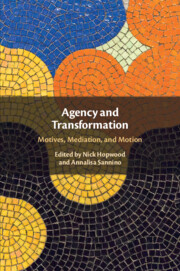Book contents
- Agency and Transformation
- Agency and Transformation
- Copyright page
- Dedication
- Contents
- Figures
- Tables
- Contributors
- Preface
- Acknowledgments
- Chapter 1 Motives, Mediation and Motion
- Chapter 2 Toward a Power-Sensitive Conceptualization of Transformative Agency
- Chapter 3 The Tasks of Reality and Reality As the Task
- Chapter 4 A Relational View of a Future-Orientated Pedagogy
- Chapter 5 From Future Orientation to Future-Making
- Chapter 6 Excluded Lives
- Chapter 7 Children’s and Youth’s Civic Projects and Responsible Agency
- Chapter 8 Decolonizing Agency
- Chapter 9 Unpacking Social Articulation of Agency
- Chapter 10 The Emancipatory Nature of Transformative Agency
- Chapter 11 Choice in Childbirth, Agency and Collective Action
- Chapter 12 Transformative Agency by Double Stimulation in an Ecological Agroforestry Association from Brazil
- Chapter 13 Transformative Agency and the Cultivation of Innovations in Frontline Homelessness Work
- Chapter 14 Children’s Agency during the COVID-19 Pandemic in China
- Chapter 15 Agency As the Direction and Reach of Actions
- Index
- References
Chapter 12 - Transformative Agency by Double Stimulation in an Ecological Agroforestry Association from Brazil
Reflections from a Change Laboratory Intervention
Published online by Cambridge University Press: 23 November 2023
- Agency and Transformation
- Agency and Transformation
- Copyright page
- Dedication
- Contents
- Figures
- Tables
- Contributors
- Preface
- Acknowledgments
- Chapter 1 Motives, Mediation and Motion
- Chapter 2 Toward a Power-Sensitive Conceptualization of Transformative Agency
- Chapter 3 The Tasks of Reality and Reality As the Task
- Chapter 4 A Relational View of a Future-Orientated Pedagogy
- Chapter 5 From Future Orientation to Future-Making
- Chapter 6 Excluded Lives
- Chapter 7 Children’s and Youth’s Civic Projects and Responsible Agency
- Chapter 8 Decolonizing Agency
- Chapter 9 Unpacking Social Articulation of Agency
- Chapter 10 The Emancipatory Nature of Transformative Agency
- Chapter 11 Choice in Childbirth, Agency and Collective Action
- Chapter 12 Transformative Agency by Double Stimulation in an Ecological Agroforestry Association from Brazil
- Chapter 13 Transformative Agency and the Cultivation of Innovations in Frontline Homelessness Work
- Chapter 14 Children’s Agency during the COVID-19 Pandemic in China
- Chapter 15 Agency As the Direction and Reach of Actions
- Index
- References
Summary
This chapter expands discussion of how to promote transformative agency by double stimulation during a Change Laboratory intervention. The intervention was conducted in an agroecological association, geared toward environmental preservation and social inclusion by strengthening family farming and developing agroforestry systems. The chapter analyzes how motives, movement, and mediation interact in the formation of transformative agency. The results show that through double stimulation, participants transformed the way they understood the origin of their problems. The intervention created a space for reflection in which, with the support of auxiliary instruments, the participants were able to produce a transformative movement, analyzing and understanding the structure of their activity, identifying conflicts of motives, and building a new orientation for the future of the activity. This intervention led to a novel concept of the coordination of the association based on the principle of shared responsibilities, as well as to the construction of a proposal to develop the organization.
Keywords
- Type
- Chapter
- Information
- Agency and TransformationMotives, Mediation, and Motion, pp. 289 - 310Publisher: Cambridge University PressPrint publication year: 2023

